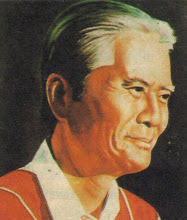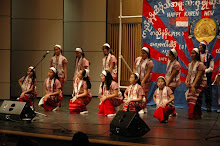One of the first holidays of the new school year, Grandparents Day, is observedပဲြေတာ္၊ ေမြးေန႕စသည္ က်င္းပ၊ on second Sunday in September. With all the work to be done at the start of classes, have you had an opportunity to plan your celebration? If not, don't panic!(ေၾကာက္စိတ္၀င္) The Web is your source(အေထာက္အထားစသည္) for grand(ခန္းနား ေကာင္းမြန္ေသာ) ideas for Grandparents Day!
Did you know that 4 million children in 3 million households are being raisedေကၽႊးေမြးျပဳစုေစာင့္ေရွာက္၊ by their grandparents? Would you be surprised to learn that more than 5 million children live in a household with a grandparent present?
It seems that grandmas and grandpas, formerly in the business of "spoiling"အလုိလုိက္ဖ်က္ဆီး၊ အလုိလိုက္ခံရ၍ ပ်က္ဆီး၊ grandchildren, are taking on additional responsibilities that involve raising their children's children.
For all that those grandparents do, we celebrate the accomplishmentsၿပီးေျမာက္ေအာင္ျမင္မႈ၊ and contributionsကူညီေထာက္ပံ့မႈ၊ of our senior citizens on Grandparents Day. How will you mark the occasion? If you haven't made your plans yet, have no fear! The Web comes to your rescueကယ္မ၊ with ten great activities for grateful kids!
PETS BRING KIDS AND SENIORS TOGETHER
Diana B. Wolan, a graduate student at Cornell University, organized a program that brought children together with seniors through unusual mediators.ဖ်န္ေျဖေရးအဖဲြ႕ "The Pet Patrol project was a collaborationပူးတဲြေဆာင္ရြက္ျခင္း between Cornell Cooperative Extension of Tompkins County, Trumansburg Ulysses Joint Youth Commission, and Trumansburg Central Schools," she explained. "This was an after-school program at Trumansburg Middle School. The students received training from an RSVP [Retired and Senior Volunteer Program] volunteer who helped prepare them for their visit to Lakeside Nursing Home."
Much preparationတင္ႀကိဳျပင္ဆင္မႈ၊ was required before the students made an "official" visit to the nursing home. "Through role-plays and activities, the students learned about the special needs of some of the people they would be visiting," said Wolan. "They toured the facility and became familiar with the routines and procedures of the building. They also received training from SPCA [Society for the Prevention of Cruelty to Animals] staff who bring animals weekly to the nursing home as part of a pet therapyေရာဂါကုထုံး၊ project.စီမံကိန္း၊ လုပ္ငန္းအစီအစဥ္၊ သုေတသနလုပ္ငန္း၊ The students learned about the kinds of animals that make good visitors, how to handle them, and how to approach the seniors with the pets. Some of the young people screened their own pets to see if they would be appropriate.သင့္ေလ်ာ္ေသာ၊ Following training, the students, adult volunteers, and parents -- and quite a menagerie(ပဲြျပ အိမ္ေမြး) တိရစၦာန္စု of pets -- visited the nursing home."
The visit was rewardingလုပ္ရက်ိဳးနပ္၊ အက်ိဳးေက်းဇူးရွိ၊ for all involved.ပါ၀င္၊ ပတ္သက္၊ The presenceရိွေနျခင္း၊ တက္ေရာက္ျခင္း၊ of the students brightened the day for the residents.ရပ္သူရြာသား၊ ရြာခံ၊ေဒသခံ၊ "Because the SPCA already has a program at this particular nursing home, the seniors expected to see the pets," explained Wolan. "What they didn't expect was the visit from the children. That was a nice surprise for many of them, and the hospital staff carefully steeredထိန္းေက်ာင္း ေမာင္းႏွင္၊ the children toward rooms where the children were able to talk to the seniors. The pets provided a nice icebreaker ေရခဲျပင္ခဲြသေဘၤာ၊ (တင္စား) to start conversations."
"The children were really pleased at how interested some of the seniors were in talking to them about their animals and how comfortable the animals were -- especially the cat that fell asleep on people's laps!" Wolan reported. "One young man said, 'I think it's really sad that they [nursing home residents] have to leave their pets when they come live here.'"
Wolan recommends activities such as this to open the eyes of students to the contributions of senior citizens. "I think it's important for young people to see seniors in many different roles, not just as patients in a nursing home. In this program, youths were trained by senior volunteers who lead very active lives. There are many seniors who have unique skills and interests that can be brought into the classroom. Inviting seniors in to lead an activity, share a hobby, or volunteer are ways for students to interact အျပန္အလွန္အက်ိဳးျပဳ၊ with older people."
TEN WAYS TO CELEBRATE IN 'GRAND' STYLE!
Grandparents Go Back to School. Many schools invite students to bring their grandparents with them to school at least one day during the year. The experience is enjoyable for students, grandparents, and teachers! What can you do once everyone is assembled? One teacher, Cheryl H., submitted an excellent idea for Grandparents Day to the Teachers.Net Lesson Bank. She suggests creating two quizzesဉာဏ္စမ္းပေဟဠိၿပိဳင္ပဲြ၊ -- one for the grandparents and one for your students. On the students' quiz, include questions about terminologyအသုံအႏႈန္းေ၀ါဟာရပညာရပ္၊ from the past. Have your students help you make the grandparents' quiz about terminology from today. Pass out the quizzes on the day of the visit, and discuss the differences in language between the age groups. The answers will keep you in stitches! အူတက္မတတ္၊
If you have students who do not have a grandparent able to attend the activities, invite them to bring a special senior, a neighbor, a relative, a mom, or a dad.
Another suggestion is to hold a grandparents tea. Combine the activity with a lesson on good manners for younger students, and your class will have a chance to show off its best behavior. Older students might enjoy planning a "senior" prom for elderly community members with old songs and memorabilia. အမွတ္တရပစၥည္း။
Grandparent Interview. Put your newshounds to work on a great story -- an interview with a senior citizen! Brainstorm a list of questions with the class, or use Education World's Interview with a Super Senior Teaching Master. More questions can be found at Sample Questions for "Interviewing" Your Grandparents on the official Grandparents Day site. If your students are too young to write the answers on paper, have them tape their interviews. Oral history can be even more effective than written! You will find a primary lesson plan that involves interviewing at Grandparents Day (scroll down to page 18). Incorporate ျဖည့္စြက္ထည့္သြင္း၊ math and science into the activity with Family Fuel Facts Reporter. Find ideas for creating a questionnaire at Developing Relationships with Older People.
Great Greeting Cards. Have your students send a personalized message to their grandparents or other seniors. You will find links to many types of cards that can be made in the classroom at Home-Made Greeting Cards. If your students have grandparents who are on-line, have them send e-mail messages with Blue Mountain's Animated Electronic Greeting Cards for Grandparents Day. Another terrificရင္သပ္ရႈေမာဖြယ္၊ way to show appreciation for seniors is with Worry Stones. Wrap the stones in tissue paper with a special message, and they make adorable, thoughtful gifts! If a card is simply not enough, take the assignment အလုပ္၊တာ၀န္၊ a step farther and have your students write letters expressing their appreciation for the support of their grandparents or other people in their lives.
Mapping Nonna and Opa. Can you say grandma and grandpa in Italian? Use this list of words that kids use for grandparents in other countries as a mapping activity with your class. Print out the World Map, and have your students find the countries and label them on their sheets. Use the outlineပုံၾကမ္း၊ map with older students and a regular map with the countries labeledအမွတ္အသား၊ for younger students. To make the assignment more complex, have your students research the words in an on-line translation dictionary such as iTools (scroll down to Language Tools) to try to determine where they are used. These words refer to grandma and grandpa in the following countries:
• Poland -- Babcia and Dziadek,
• Germany -- Oma and Opa,
• India -- Nana-ji and Nani-ji,
• Korea -- Halmonee and Halabujee,
• Greece -- Ya-ya and Pa-pu,
• Japan -- Oba-chan and Oji-chan,
• China -- Popo and Gong-gong,
• Italy -- Nonna and Nonno,
• Israel -- Savta and Saba,
• Cuba -- Abuelita and Abuelito.
Visit a Nursing Home. Did you know that 60 percent of nursing home residents never have a visitor? Schedule a field trip to a local nursing home, and have your students adoptေမြးစား။ရပ္တည္၊ "grandparents" or "secret pals(မိတ္ေဆြ၊)" to cheer. As a pick-me-up, they may bring handmade Placematsပန္းကန္ျပားခံ၊ for the seniors. (See another placemat idea.) Students and residents may teach one another about hobbies they enjoy or read books and stories together. As a part of this activity, create a Forget-Me-Not
bulletin board (notice-board)for your classroom or school. Be advised that visiting a nursing home may not be appropriate for all students. It is important to remind students that though some seniors require care, many do not, and they lead productive, independent lives.
Family Tree. Grandparents Day is the perfect time for students to study their family trees. Family Tree Chart and My Family Tree will help your students organize their relatives to illustrate their ancestral ဘုိးဘြားပိုင္ history. This is a great activity for students to complete with their grandparents. Older students can go further with their research and use sites such as Genealogy.com and Ancestry.com to find their long-lost roots. Post a world map in your classroom, and have the students mark the countries in which their ancestors lived.
Graphing the Ages. Your students can illustrate the median ages of people in regions of the United States or by state with the data found at Estimates of the Median Age of the Population for the U.S. Where does your state stand in the larger national picture? Access more data from the U.S. Census Bureau, including statistics စာရင္းအင္းပညာ about American households and changes in population.
Poems for Grandma and Grandpa. Invite your students to share their thoughts about grandparents poetically. Their work may be serious, humorous, or fanciful စိတ္ကူးယဥ္ တတ္ေသာ . Examples from the Internet include At Grandma's House and Sammy Snake's Grandpa by "Grandpa" Tucker. Consider having your students write poems or create artwork; you can find some samples နမူနာ to motivate them in the contest ယွဥ္ၿပိဳင္ပဲြ resources at National Grandparents Day. (Note: The contests have not been run in several years, but the samples are available for viewing.)
Bag of Fun. Gather a few materials and put them in bags for students to take with them and share with their grandparents or a senior friend. You might use paper lunch bags and have your students decorate them with crayons ေရာင္စုံခဲတံ or markers. You might include the Hand in Hand Activity and some of the Grandmother or Grandfather coloring sheets. Other possible items for the bags might be student-made stories or books, cards, tea bags or hot chocolate mix, cookies you have made or decorated in class, a favorite classroom song, and any other items that encourage students to share. Mature students may create a portfolio of their class work and take a favorite book to a scheduled visit with their grandparents.
Vaudeville Performance. Read Song and Dance Man, by Karen Ackerman, to your class. This is the story of a grandpa who entertains ဧည့္ခံ his grandchildren with an impromptu Vaudeville show from props stored in an old trunk. Talk about the various types of performers -- dancers, comedians, လူရႊင္ေတာ္ magicians, and singers -- and have your students separate into groups and orchestrate ဇာတ္တုိက္ their own short skits. You, or an especially outgoing student, may serve as the master of ceremonies. Hold a dress rehearsal ဇာတ္တုိက္ျခင္း after a few days of practice, and invite grandparents to attend a command performance in the classroom.
For more book resources for Grandparents Day, check out the list Books to Celebrate Grandparents Day. A popular story used by many classroom teachers is Wilfred Gordon McDonald Partridge, by Mem Fox. Curriculum suggestions for the book can be found at Book Bridges: A Family Literacy Program. In the young adult category, Rules of the Road by Joan Bauer is a favorite. Find out more about the author at The Bulletin of the Center for Children's Books: Joan Bauer. For young children, there are few better stories about grandparents than Just Grandma and Me, by Mercer Mayer.
ASC English was established in 1991 by a group of educational professionals to provide high quality, reasonably priced, language programs to foreign students.
As ASC worked with international students, it became clear that students needed additional preparation to be more competitive. In order for students to achieve their goals, they often need to take standardized tests or exams such as TOEFL, TOEIC, SAT, MCAS, and ISEE. ASC is a response to this growing need.
With ten years of experience and a goal-oriented curriculum, ASC’s academic programs empower students to realize their dreams. The goal of ASC is to provide quality educational programs. Teachers and staff work hard to provide a supportive environment for our students and have been able to maintain strong student-teacher interaction. At ASC we believe students will find the tools they need to be successful.
The ASC’s Super A Program was created as a highly academic program for international students and is coordinated with local universities such as Eastern Nazarene College and Northeastern University. Whatever your level is, ASC provides a course to fulfill your needs. Students will be placed either in an Intensive English, TOEFL, or Academic English course according to their ability.
Intensive English: Geared toward building a strong English foundation; Curriculum focuses on conversational English, basic grammar, writing, and reading
TOEFL: Score 50 - 100 points more in a short period of time; Curriculum focuses on students’ 17 most common test errors
Academic English: English for higher education and international career; Curriculum focuses on presentation, discussion/debates, and research projects
Sunday, July 13, 2008
Ten Great Activities for Grandparents Day
Subscribe to:
Post Comments (Atom)










No comments:
Post a Comment